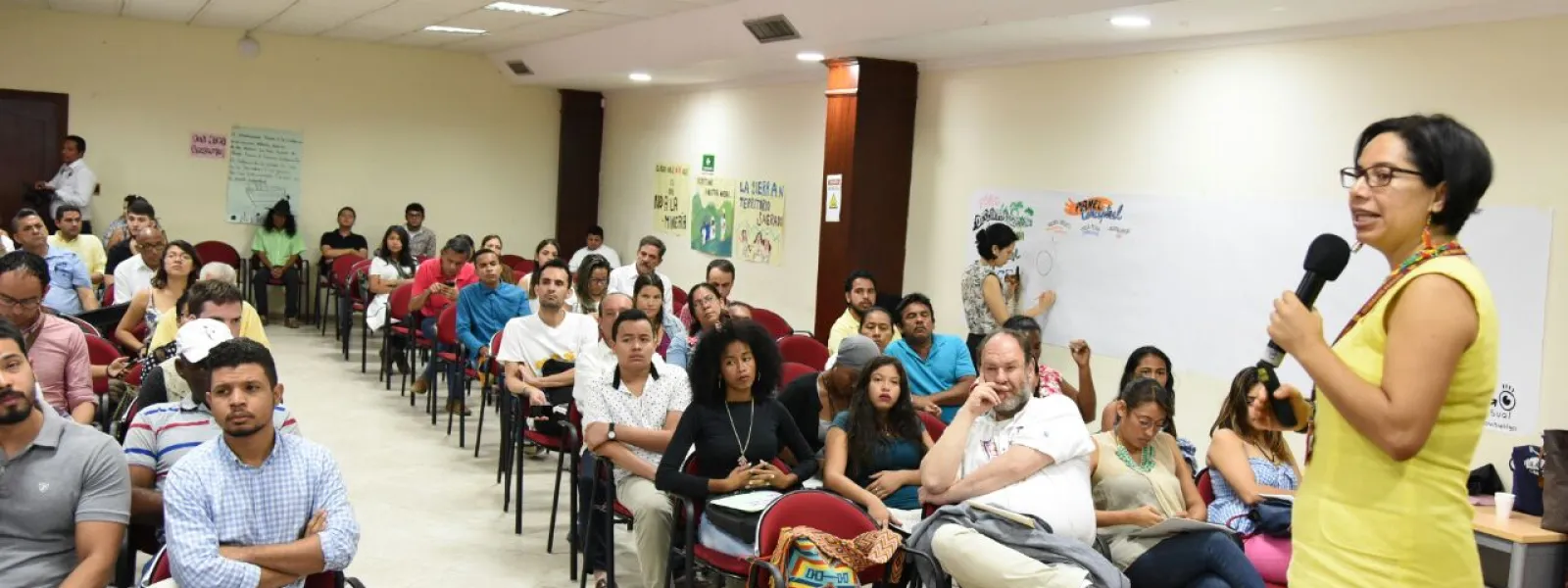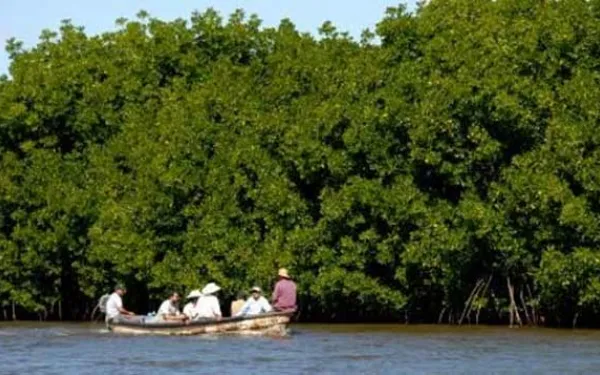
Project
Organizing the Network for Environmental Justice in Colombia
The Network for Environmental Justice in Colombia is an effort to coordinate organizations and legal resources for the protection of human rights and the environment.
The Network was founded in 2010 under the coordination of AIDA and with the help of the Latin American Institute for Alternative Society and Law, the Institute for the Study of Peace and Development, the Inter-Ecclesial Commission for Justice and Peace, and the University of Los Andes, the University of Caldas, and Del Rosario University. The network began with 79 participants and now includes more than 500 people and participating organizations.
The Network’s principal objective is to propose solutions to environmental conflicts in Colombia. It also aims to promote the fair and effective use of international and domestic environmental law, in particular, the right to a clean and healthy environment.
What does the network do?
- Facilitates the exchange of knowledge and information to implement legal strategies in precedent-setting cases. One such project was the Mandé Norte Mine, in which several members of the Network developed a legal strategy, resulting in a judicial decision that established Colombia’s need to perform an independent environmental impact assessment. Most importantly, the decision also mandated that developers obtain the consent of indigenous peoples before moving forward with any projects in their territory.
- Promotes organizational alliances, garners support, and connects legal work in defense of the environment.
- Organizes conversations, forums, and constructive debates on environmental issues.
- Provides access to legal resources including laws, court decisions, articles and legal analysis, and facilitates communication through its website and social media channels.
- Advises law students through the AIDA volunteer program. In doing so, the Network strengthens the capacity for environmental law in Colombia.
Partners:

Protection of Sinaloa’s mangrove swamps put off
By Sandra Moguel, legal advisor, AIDA, @sandra_moguel Marismas Nacionales, the largest wetland in Mexico, is still at risk almost four years since the announcement of a proposed decree to protect it from threats such as major tourist developments. Mexico is the country with the largest number of sites designated as wetlands of international importance in Latin America and yet, surprisingly, these sites have not been looked after. By signing up to the Ramsar Convention[i], the Mexican government made a commitment to draw up plans for, defend and promote the wise useof these ecosystems, as well as to expand its system of protected areas[ii]. Marismas Nacionales is the largest wetland in Mexico, located between the states of Sinaloa and Nayarit. It has been a Ramsar site since 22 June 1995, which means it belongs to the international system for the protection and regulation of wetlands of international importance. The Recommendations of the Ramsar Advisory Mission from 2010 point out that although politically the ecosystem is pided into two different regions, ecologically the two sections of wetland have many things in common and therefore their management should be tackled as a whole. The federal government has already protected the Nayarit portion of the wetland, but four years since the publication of an official Announcement of Decree on the Sinaloa Marismas Nacionales Biosphere Reserve, the procedures for the creation of this Protected Natural Area, which would cover 47,556 hectares of mangrove forest, are yet to be completed. Meanwhile, the construction of massive infrastructure remains a threat to Marismas. The Pacific Coast Integrally Planned Centre – now known as Playa Espíritu (Spirit Beach) – and the Isla de Palma Development are both projects which put this site in jeopardy. The first of these projects has obtained environmental permission to build a 10,000-room resort (although the official proposal involved 44,000 rooms), while the second includes plans to construct accommodation for 200 guests, located in a nuclear zone according to the Sinaloa Marismas Nacionales Biosphere Reserve. The Mexican Secretariat of Environment and Natural Resources (SEMARNAT) justified its authorisation of the Integrally Planned Centre project explaining that the site had not been designated as a Protected Natural Area (or ANP by its Spanish acronym). It is currently studying the environmental impact study on the Isla de Palma development, but it is entirely possible that the argument of the effect it will have on a mangrove area and the habitat of highly migratory birds will not be enough to reject the application for environmental permission. In its Sectoral Program for the Environment and Natural Resources 2007-2012, the federal government promised to increase the total area of land designated as belonging to Protected Natural Areas from 22 million hectares in 2007 to 25.6 million in 2012. But how can this conservation objective be realised if the sites which are expected to be declared Protected Areas at the end of the six-year program have not been “protected”? The declaration of the Sinaloa Marismas Nacionales Biosphere Reserve is not the only decree of its kind to have been delayed: it is much the same story for La Sierra La Laguna and Balandra in Baja California Sur, Santuario Madera in Chihuahua and Ejido el Palmito in Sinaloa, to name but a few. The lack of coordination amongst administrative entities and the disparate organs which make up the environmental sector, combined with insufficient planning instruments such as ANP decrees, prevent decision-making which would favour conservation. Putting off these decrees is unjustifiable regardless of the fact that SEMARNAT’s legal department is swamped with ANP justification studies needing to be examined, or that there may be political reasons for delaying their approval. Issuing a decree on Sinaloa Marismas Nacionales is one way of guaranteeing the constitutional right to a healthy environment, as well as fulfilling international obligations such as Ramsar. It also protects the economic activities of the communities which depend on this ecosystem. [i] Ratified by Mexico on 20 December 1984 and published in the Official Gazette of the Federation on 24 January 1985. [ii] Resolution IX. 22 of the Ramsar Secretariat on wetlands and systems of protected areas, 9th Meeting of the Conference of the Contracting Parties, Uganda, 8-15 November 2005.
Read moreAIDA President Manuel Pulgar-Vidal named Peru Environment Minister
The Interamerican Assocation for Environmental Defense (AIDA) congratulates Manuel Pulgar-Vidal for being named head of Peru’s Environment Ministry. An accomplished environmental lawyer and thought leader, Pulgar-Vidal served as the President of AIDA's Board of Directors for eight years. He is only the third Peruvian to be sworn into the government's top environmental post. We are extremely thankful for all the hard work and guidance Pulgar-Vidal has provided AIDA since he helped found the organization in 1996. The appointment is a well-deserved recognition for a man who has dedicated his life to defending human rights and the environment. His new role won't be easy. Pulgar-Vidal joins a young government faced with its first crisis: widespread popular dissent over the potential environmental impacts of a massive proposed gold mine. But the opportunity to strengthen environmental governance and institutionalize environmental health protections is priceless. We know he's up for the challenge.
Read moreAIDA presents report at Durban linking climate change to decline of human rights in Latin America
Calls for measures to protect the human rights of the most vulnerable communities. Durban, South Africa – On Wednesday, December 7, 2011, the Interamerican Association for Environmental Defense (AIDA) presented delegates at climate meetings in Durban, South Africa with a report detailing the negative effects of climate change on human rights to life, access to water, health, food, and housing for millions of people in Latin America. “Climate change causes the greatest harm to the human rights of those who are least responsible for greenhouse gas emissions – vulnerable and historically disadvantaged communities such as peasant farmers, indigenous peoples, and the urban poor,” said AIDA staff attorney Jacob Kopas. “Governments disproportionately responsible for historical and current emissions have an international obligation to contribute more to lasting solutions.” The most troubling of the impacts detailed by the report is a dramatic reduction in access to freshwater in Latin America. Increased melting of glaciers, degradation of high-mountain páramo wetlands, erratic weather patterns and severe droughts will limit dry-season access to water for up to 50 million people in the Tropical Andean region by 2050. Other impacts include heavier rains and flooding, which affected 2.2 million people and caused $300 million of damages in Colombia alone in 2010, and the loss of 80% of Caribbean coral reefs due in large part to warming ocean temperatures and ocean acidification. “The parties must understand that the climate change problem can no longer be ignored. We need to act now to help the world’s most affected communities cope with climate change by securing urgent yet attainable solutions like the Green Climate Fund here in Durban,” said AIDA attorney Andrés Pirazzoli, who distributed the report to delegates at the meeting. AIDA backs the Green Climate Fund, which would finance low-carbon technology adoption and adaptation programs in the developing world. AIDA issued the report this week to inform an investigation by the Inter-American Commission on Human Rights (IACHR) on the link between climate change and human rights. The report calls for a binding climate treaty and for the biggest emitters to pay for adaptation and mitigation measures in the developing world.
Read more